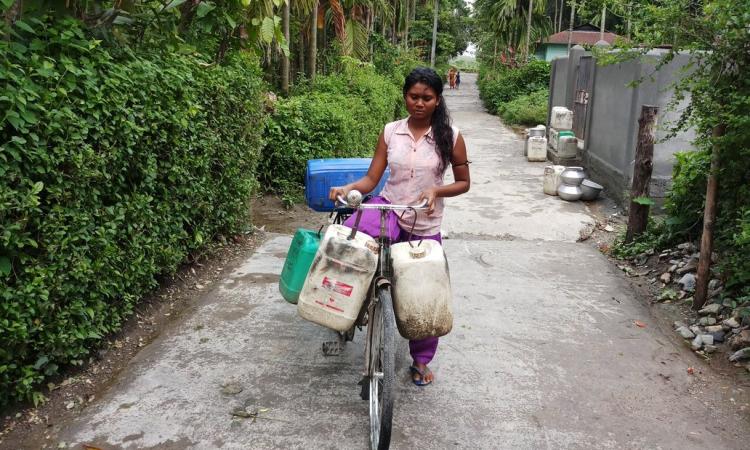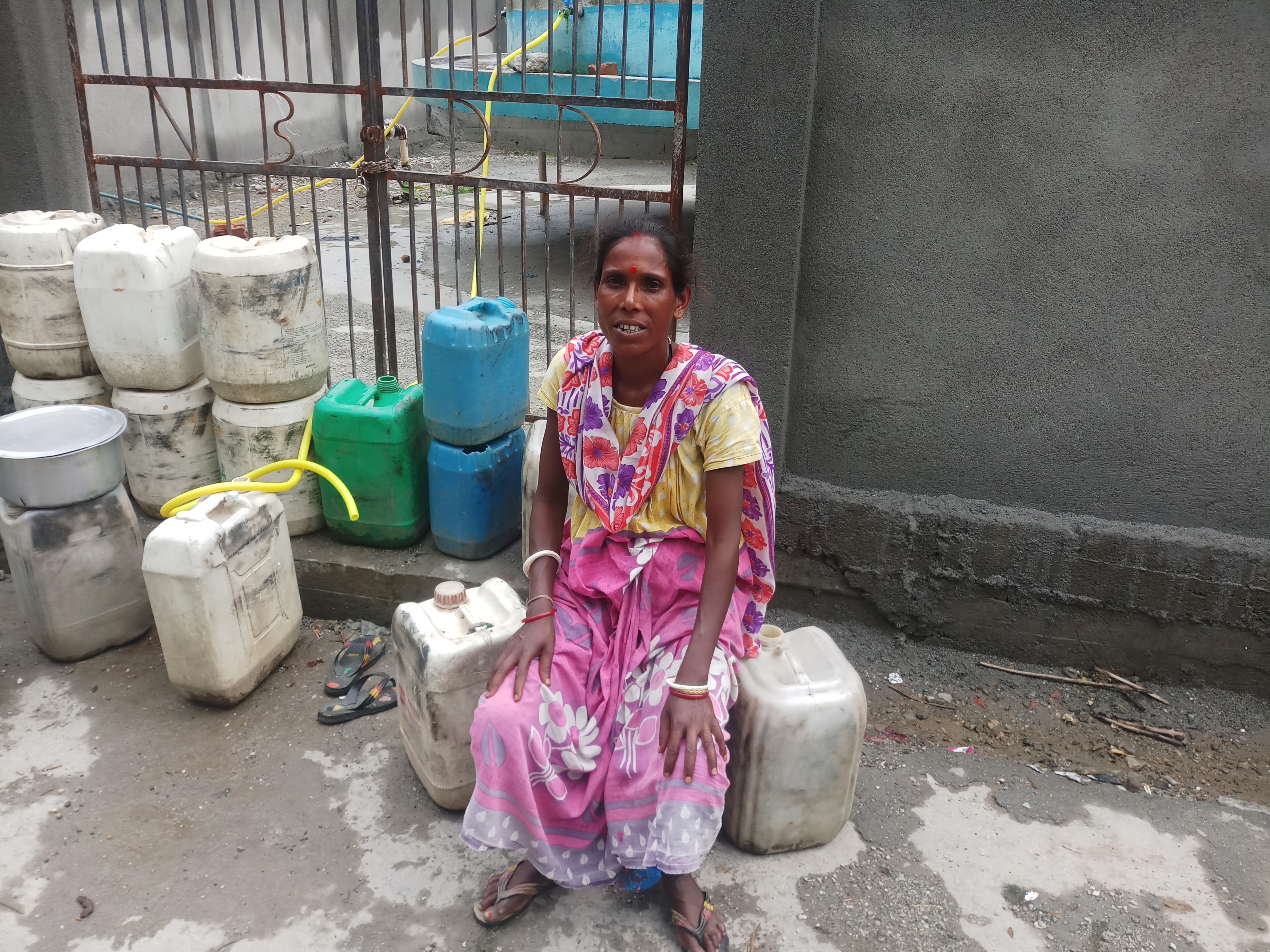
A lot has been discussed about the acute water crisis in many parts of India. But who would have thought some villages in rural West Bengal have to depend on a neighbouring nation for water? Thanks to administrative failure, four villages surrounding the Bandapani tea estate in Alipurduar district of West Bengal, around 600 kilometres from Kolkata, get water from Bhutan for their daily needs.
Situated in the foothills of Bhutan, Bandapani tea estate was once a thriving tea garden where thousands of people worked. It has been six years since it has closed its operations. Surjanand Tamang, head clerk of the tea estate says that most of the tea gardens located in the foothills had an agreement with the Bhutan administration for water supply. “The water drawn from underground was not enough for the tea gardens so the owners had an agreement with the Bhutan administration for supplying water. They (Bhutan) used to charge Rs 8000 annually from each tea garden. But we (Bandapani) stopped paying bills after the tea garden was closed in 2012 but they continue to give us water. They occasionally send reminders for clearing the dues but owners are yet to take note of it,” he says. 
Tea gardens closed, no water for workers
The closure of the garden kick-started the water woes of nearly 20,000 people living in four villages—Kalibari, Nepali Lane, Jungle Line and South Line—surrounding the Bundapani tea estate with a majority of them constituting erstwhile tea garden labourers. One such labourer, Gopal Lama says that the authorities used to supply water to them through pipes at fixed hours of the day but it stopped after the closure of the garden.
Desperate times call for desperate measures. Finding no alternative source of water, the villagers chanced upon an idea. They made a hole in the iron pipe that supplied water to the tea garden from Bhutan. “We had no alternative left as there were no other sources of water. Our children could have died of starvation had we not done this for water,” adds Lama justifying the step taken by them.
The pipe passes through a dense jungle. Villagers collect water from this “leaked” pipe every day risking their lives to attack from wild animals. Villagers say that at least six to seven attacks by wild elephants on villagers are reported every month. Recently, 25-year-old Nandaram Orao, en route to fetch water, was trampled on and killed by elephants.
Wild elephants also destroy the pipe. “Wild elephants are quite regular in the area where the pipe is located. They often damage the water pipe. It adds to our inconvenience as we have to invest in repairing it. It normally takes many days to repair as mechanics are not easily available here as this is a remote area,” says Shekhar Gowala, a student who has the responsibility of collecting money for the repair of the pipe.
Long trips for water
Villagers say that it often gets difficult to collect water from the pipe as several people from the neighbouring villages also depend on it. “People from other villages also come here to take water. It is riskier to go inside the deep jungle during the night because of wild animals,” says Damini Minj (22), a Kalibari resident. The alternative is a tap located at the slum, Aiba basti which is about eight kilometres from the villages. Minj says she, along with other women, travels three to four times a week to Aiba basti for water. “We go by bicycles or walk. We start the journey even before the break of the dawn to avoid the crowd at the daybreak to collect water. We sweat profusely while cycling with 30-40 litres of water filled in the jars,” she says. 
She says the path to the foothills is fraught with dangers of elephants and other wild animals. “The stretch is muddy and full of potholes which make it difficult to ride the bicycle with heavy water-filled jars. Moreover, we are at a constant risk of being targeted by wild elephants and snakes. The government has done nothing for us. The political leaders come during elections and disappear after that,” she adds.
Villagers say that the majority of the 13-15 hand pumps installed in four villages do not work and even the operational ones give dirty water not fit for drinking.
Administration continues to be apathetic
The apathy of the administration can be gauged from the fact that it has recently constructed a water tank in Kalibari which works only with the solar energy. “It is a sheer mockery of our miseries. The water tank is able to draw water from underground only when the sun is strong. We have to stand in a long queue for several hours to get a bucket of water with a prayer on the lips for sunshine. They should have connected it with electricity,” fumes Gisna Kundu, a homemaker.
Apart from potable water, villagers also have to make perilous journeys multiple times for daily chores such as washing of clothes. “The situation gets worse in summers when the demand for water is high. It is daunting to travel kilometres with heavy buckets of water. We often have to make several trips when there are guests at home. Mostly the women folk have the responsibility of bringing water as men are out of the house for work,” she adds.
The villages across Bundapani are surrounded by the Charu Nadi (river) which should ideally be their water source. But the river is dammed by Bhutan and there is water in the river only when Bhutan releases it from its dams. The river, however, overflows during monsoon, snapping the villages off from the rest of the district. “The overflowing river disconnects us from the rest of the district. Children miss schools for days till the water level recedes. The worst hit is the health service,” says Anil Gope, a Jungle Line resident.
Ajay Kharia, the local gram pradhan of Bundapani concedes that the problem is grave but says that the administration has already been informed. “We have already alerted the concerned authorities about the problems faced by the people. They have assured me that they will take adequate action to solve the water crisis,” he says.
Tanmay Biswas, the block development officer (BDO) of Madarihat, under whose jurisdiction Bundapani falls, agrees that the entire block is reeling under water crisis and a proposal has been sent to the government to install more tubewells. “Almost all the blocks in my jurisdiction is facing water crisis. We have already asked the state government to accept our proposal of installing more water pipes in the area,” he says. He, however, refuses to speak much about the problems faced by people in Bundapani citing that he has been newly transferred to the area and is yet to understand it fully.